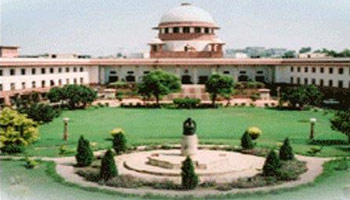SC adjourns hearing on SLP against Krishna Tribunal verdict

The Supreme Court on Monday adjourned hearing on the Special Leave Petition filed by the Andhra Pradesh government on the verdict given by the Krishna Water Dispute Tribunal to July 12.
The Krishna Water Dispute Tribunal had given its verdict on December 30, 2010.
Earlier on March 29, the Andhra Pradesh government had moved the SLP in the Apex Court, challenging the Krishna Water Disputes Tribunal verdict about allocating an additional quantum of water to Karnataka and Maharashtra. The AP government had said that the Tribunal had acted in an arbitrary and illegal manner while allocating the quantum of waters to Karnataka and Maharashtra states.
The Maharashtra and Karnataka governments requested Supreme Court not to accept the Special Leave Petition.
However, the AP government has argued that the Tribunal lacked the jurisdiction for the cited allocation to the other states and urged the Apex Court to quash the Tribunal's decision.
The SLP argues that Andhra Pradesh would lose out on around 130 TMC ft of surplus water because of the Tribunal's decision. The state was awarded an additional 190 TMC ft water in its verdict dated December 30, 2010.
The state government has also objected to the Tribunal agreeing to Karnataka's decision of raising the height of the Almatti dam from the present 519 metres to 524.5 metres, fearing that it would affect the Kharif crops across 13.5 lakh acres in the fertile Krishna Delta, which is the 'rice-bowl' of Andhra Pradesh.
The SLP also pointed out that the Tribunal has failed to adopt the proper and correct application of the principle of equitable allocation of the inter-state river water between the upper and the lower riparian states.
The state government has further argued that the Tribunal's jurisdiction was limited to adjudicating only the matters that were covered by the complaints of the 3 riparian states, but the body had acted without jurisdiction by going beyond the matters raised in the complaints.



